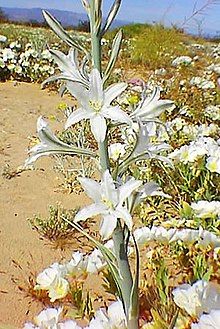Hesperocallis
| Hesperocallis | |
|---|---|

| |
| Scientific classification | |
| Kingdom: | Plantae |
| Clade: | Tracheophytes |
| Clade: | Angiosperms |
| Clade: | Monocots |
| Order: | Asparagales |
| Family: | Asparagaceae |
| Subfamily: | Agavoideae |
| Genus: | Hesperocallis |
| Species: | H. undulata
|
| Binomial name | |
| Hesperocallis undulata A.Gray, 1868
| |

Hesperocallis is a genus of flowering plants that includes a single species, Hesperocallis undulata, known as the desert lily or ajo lily.
It is found in the desert areas of southwestern North America, in Northwestern Mexico, California, and Arizona. The plant grows in Mojave Desert and Sonoran Desert habitats.
Taxonomy
[edit]In the APG III system, adopted here, Hesperocallis is placed in the family Asparagaceae, subfamily Agavoideae, since recent molecular systematic studies (Pires et al. 2004) have confirmed a close relationship with Agave.[1] Other classifications have included the species in its own family, Hemerocallidaceae, or placed it in the Hostaceae (Funkiaceae); both families are submerged into the Agavoideae in the APG III system.[2] As with many of the 'lilioid monocots', prior to the use of molecular evidence in classification, it was placed in the Liliaceae.
Uses
[edit]The bulbs of the desert lily are eaten by native peoples.[3]
References
[edit]- ^ Stevens, P.F., Angiosperm Phylogeny Website: Asparagales: Agavoideae
- ^ Chase, M.W.; Reveal, J.L. & Fay, M.F. (2009), "A subfamilial classification for the expanded asparagalean families Amaryllidaceae, Asparagaceae and Xanthorrhoeaceae", Botanical Journal of the Linnean Society, 161 (2): 132–136, doi:10.1111/j.1095-8339.2009.00999.x
- ^ "American Indian Ethnobotany Database: Hesperocallis undulata". Archived from the original on 2012-02-15. Retrieved 2011-04-03.
Further reading
[edit]- Pires, J. C., I. J. Maureira, J. P. Rebman, G. A. Salazar, L. I. Cabrera, M. F. Fay, and M. W. Chase. 2004. Molecular data confirm the phylogenetic placement of the enigmatic Hesperocallis (Hesperocallidaceae) with Agave. Madroño 51: 307–311.
- NCBI Taxonomy Browser
